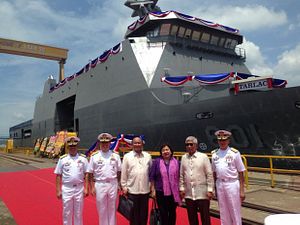In 2014, Indonesia’s state-owned shipbuilder, PT PAL, secured a contract worth $92 million to deliver two Strategic Sealift Vessels (SSVs) to the Philippines, with the first one sent through last May and the second expected to be delivered this April. As I indicated at the time, the inaugural export of locally-built warships was seen as a major boost to Indonesia’s efforts to build up its domestic shipbuilding industry, which President Joko “Jokowi” Widodo had emphasized as a priority (See: “Indonesia to Export First Ever Warship in Boost for Shipbuilding Industry”).
Over the past week, however, the deal has gone from a sign of promise for Indonesia’s defense aspirations to yet another blot on the country’s record on defense deals. Indonesia’s Corruption Eradication Commission (KPK) has detained several PT PAL officials as part of an investigation into alleged corruption involving the warships deal. So far, the evidence appears to indicate that PT PAL and an agency called Ashanti Sales had agreed to a cashback deal from the sale that amounted to about 4.75 percent of the contract’s value.
According to KPK deputy chairwoman Basaria Panjaitan, after learning of an impending illicit deal, the KPK carried out a sting operation that led to the arrest of 17 people, four of whom it eventually named as suspects. This included the company’s chief, Firmansyah Arifin, treasury manager Arif Cahyana, finance director Saiful Anwar, and Agus Nugroho, an executive employed by Ashanti Sales. Investigators allegedly found three envelopes totaling $25,000 in cash in Arif’s possession during the bust.
“This is the first KPK sting operation in the shipping industry,” Basaria said according to The Jakarta Globe. “The KPK is very concerned because the shipping industry has been the nation’s pride, but now is plagued by the misconduct of officials at PAL,” she added, noting that the case would damage the country’s international reputation.
What happens next to the deal itself and PT PAL is far from clear. Over the weekend, PT PAL public relations chief Bayu Wicaksono said the second SSV delivery itself would still be made in mid-April in spite of the allegations because the firm was still committed to fulfilling the terms of the contract and demonstrating the good quality and competitive pricing of the Indonesian-made vessels. As true as that may be, it is difficult to see how the blow to PT PAL’s reputation which Basaria pointed to will not factor into things going forward as well, to the detriment of Indonesia’s aspirations in the shipbuilding industry (See: “An Indonesian Defense Revolution Under Jokowi?”).

































